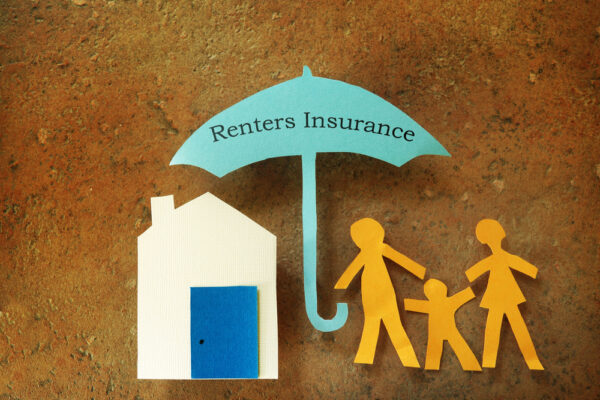Whether you’re a fledgling landlord leasing your first house or an experienced property manager overseeing multiple complexes, it’s important to understand the differences between landlord insurance and renters insurance, and how the two work to complement one another. Landlords and tenants have different interests to protect, and so naturally they require different types of coverage, but both parties benefit from learning the ins and outs of each. Generally speaking, landlord insurance covers the property owner, while renters insurance covers the resident. However, there are ways in which the types of coverage overlap, and together they can ensure that both sides of a lease agreement are happy.
Landlord Insurance: What It Is, and What It Isn’t
Landlord insurance, which is also sometimes referred to by the more technical names “rental property insurance” or “dwelling fire insurance,” is purchased by the property owner and covers the rental  property itself, including the exterior and the roof of the building. Landlord insurance plans usually cover structural damage, liability, and any furnishings or appliances in the property that belong to the property owner rather than the tenant, and some landlord insurance policies can even cover certain types of damage caused by tenants. Additionally, they can protect against the loss of rent in the event that a property becomes temporarily vacant (due to a covered peril or necessary repair). If you’ve experienced the financial drain of an unoccupied or uninhabitable property, you can readily understand the value of this particular aspect of landlord insurance.
property itself, including the exterior and the roof of the building. Landlord insurance plans usually cover structural damage, liability, and any furnishings or appliances in the property that belong to the property owner rather than the tenant, and some landlord insurance policies can even cover certain types of damage caused by tenants. Additionally, they can protect against the loss of rent in the event that a property becomes temporarily vacant (due to a covered peril or necessary repair). If you’ve experienced the financial drain of an unoccupied or uninhabitable property, you can readily understand the value of this particular aspect of landlord insurance.
Landlord insurance is different from renters insurance in a number of ways, but it’s also not to be confused with homeowners insurance. The primary difference between landlord insurance and homeowners insurance is that the former covers rental properties and protects a landlord’s financial interests, while the latter only concerns a person’s primary residence and the personal property it contains. For this reason, a homeowners insurance plan simply won’t cut it for someone offering long-term rentals, and the two different types of coverage differ in significant ways. Being a landlord comes with a host of unique and inherent risks, and landlord insurance provides a comprehensive means of protecting yourself against those risks.
Lastly, you will sometimes see the term “landlord liability insurance” tossed around, and this typically just refers to the liability coverage that is usually (but not always) offered as a standard component in many landlord insurance packages. When shopping for insurance, you should make sure that your plan includes landlord liability insurance, as this will help protect you in the event that a tenant or third party sues you over bodily injury or property damage.
Renters Insurance: What It Is, and Why Landlords Should Require It
If a rental property is struck by lightning and the landlord has a landlord insurance policy that covers that particular peril, then the ensuing costs related to damage (and potentially even lost rent due to uninhabitability) are likely covered. But what about the tenant’s personal property? What if their $2,000 flatscreen gets fried? If they don’t already have renters insurance, the tenant will probably wish they had purchased it (and so might the landlord, which I’ll get to later).
The primary way in which renters insurance differs from landlord insurance is right there in the name: the renter’s personal property is protected, not the landlord’s. Unless an apartment or house is already furnished, in which case the landlord’s furniture would be covered by landlord insurance, a tenant will need to purchase renters insurance in order to protect their own furniture—as well as electronics, clothing, jewelry and other property—from damage or loss due to covered perils, including theft, vandalism, fire, and even some natural disasters.

Some renters insurance policies even offer the flipside of the uninhabitability coverage included in landlord insurance plans: protection against loss of use. If a tenant is forced to vacate the property because of structural damage and/or significant repairs, renters insurance can help cover the cost of temporary living arrangements such as a hotel stay or interim rental.
Last, but certainly not least important, is liability. In the event that a guest or third party is injured in the rental property, renters insurance can help cover any resulting legal feels, settlements, and judgements. As far as landlords are concerned, this may be the most important aspect of renters insurance, as it provides an added layer of protection that complements whatever liability coverage is included in the landlord insurance plan.
As a landlord, you obviously don’t need to worry about personally acquiring renters insurance for the properties you oversee, but that doesn’t mean you shouldn’t encourage or even require that your tenants obtain coverage.
So, can you require renters insurance? Yes, and you probably should. Landlords usually can’t be held responsible in the event that a tenant’s property is stolen or damaged, but costly disputes can be avoided by requiring tenants to have a renters policy. For this reason, it can be a good idea to stipulate in your lease agreement that the tenant is responsible for obtaining renters insurance.
Even if you aren’t going to require that your tenants purchase renters insurance, you should still strongly encourage it. Some tenants might balk, thinking that it costs a fortune and requires a great deal of research to insure an entire apartment’s worth of property, but in actuality it’s an affordable and easy-to-navigate process. If one of your tenants expresses such concerns, assure them that they likely can insure their property for anywhere from just $12 to $30 per month (or even less, if they bundle it with their auto insurance), and that it doesn’t take very long to get renters insurance: a tenant can get coverage in 24 hours or less, and sometimes even fewer than 30 minutes. Beyond tallying an inventory of the value of all their personal property, all a tenant has to do is enter some basic information into a website, and their personal property is insured.
Are you looking to add to your revenue per unit? Consider offering renters insurance to your residents through a program like Pinata. You can package renters insurance and resident rewards to monitor which residents are up to date on their insurance policies and reward them for paying rent on time. This can add additional revenue to your bottom line while also ensuring your tenants are covered.
Shopping for Landlord Insurance: Where to Begin
So, now you know the primary differences between landlord insurance and renters insurance, but you still need to find the right type of landlord insurance that’s perfect for your particular property (or properties). How do you make an informed decision and pick the right provider and plan?
Start with the basics. In the same way that a tenant needs to compose an inventory of their personal property before purchasing renters insurance, you’ll need to determine the amount of coverage needed for your building (or buildings), personal property (provided furniture, or appliances such as fridges, stoves, and dishwashers), and liability. If you own multiple properties, you’ll need to decide between one single landlord insurance policy to cover all of them, or a patchwork of separate policies to cover each one individually. Landlords who own and operate multiple properties will need to account for a number of factors when shopping for landlord insurance, including the location, size, and value of each of their properties, as well as the different types of tenants and their potentially different rental activities. Whatever policy you end up purchasing, you need to make sure all your bases are covered.

As with any other type of insurance, be it auto or health, before making a decision you’ll want to get a sense of all the different plans out there, paying special attention to perils covered, differences in claims handling processes, exclusions and limitations, and of course the deductibles and premiums on offer. Make a list of specific things to look for, such as whether a particular landlord insurance plan covers tenant damage, or whether flood or earthquake protections are included, and keep this list handy during your research.
Now that you’ve made an exhaustive inventory of your property (or properties), you may be wondering where you can actually buy landlord insurance. It’s important to note that while you can certainly purchase landlord insurance from recognizable names like Progressive, Allstate, and Geico, there are also companies that deal exclusively in landlord insurance. For example, Steadily is a technology-focused insurtech company that offers plans for traditional single-family homes, apartment buildings, and condominium units, and it also has insurance packages catering specifically to property owners operating in the Airbnb and Vrbo sector. Yes, big names like Geico can probably provide most of what you’re looking for, but you may want to look further afield if you’re in search of a more specialized plan. Do your research, take your time, and go with the company and plan that best fit your particular situation, not just whatever pops up first on Google.
Landlord Insurance and Renters Insurance: They Just Go Well Together
There’s one obvious reason that landlord insurance and renters insurance are not the same: the two concerned parties have different interests to protect. But that doesn’t mean that they don’t complement one another. It’s safe to say that if you’re currently leasing a property, you probably already have landlord insurance. The same cannot be said for tenants and renters insurance, as not all landlords require their tenants to purchase renters insurance. If you don’t require it, you should at least encourage your tenants to obtain renters insurance, as it really does benefit both sides of the lease agreement.
Yes, the liability protection aspect of renters insurance is important to landlords, as it adds another layer of security against potential lawsuits, but there is another, perhaps unsung reason to encourage your tenants to purchase renters insurance: it improves landlord-tenant relations. Talk to any property owner who’s spent a significant amount of time in the game, and you’ll learn that soured relations and breakdowns in communication come with the territory, so why not bolster your relationship with your tenant on day one? It costs your tenant very little, and it costs you nothing.
Anything found written in this article was written solely for informational purposes. We advise that you receive professional advice if you plan to move forward with any of the information found. You agree that neither Lula or the author are liable for any damages that arise from the use of the information found within this article
